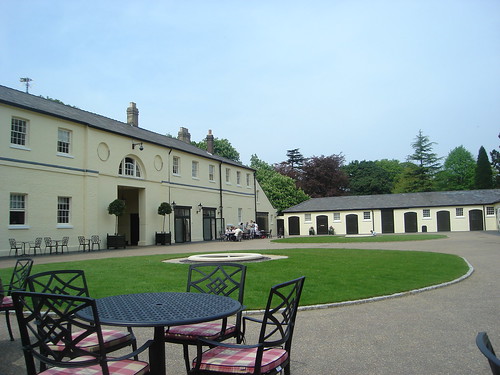Yes, the first of week of driving to and from work. I have been let loose on the UK roads. Although still in my temporary car, with the X3 on official order, here are my initial observations:
* I keep walking to the left hand side of the car to get in...yes...that darn steering wheel is on the right hand side.
* When I reach for the gear shift, I reach with my right hand...oops, that won't work because I need to shift with my left hand.
* judging corners when driving on the right hand side of the road is hard work.
* don't get me started on figuring out who has the right-of-way on London roundabouts. Think NYC traffic with roundabouts going on and off of highways.
* scratch that last statement ... theya ren't called highways here...they are dual carriageways.
* sticker shock...gas is about 10 USD a gallon. So, you Texans don't complain.
* On Day 3 of driving, I actually ventured to drive to Heathrow Airport to drop off a colleague - had I lost my mind?
and the final comment - I still have to take a driving test to be leagl long-term. it is not as bad as it seems, I do have a 12 month grace period but that clock is ticking...four months into the twelve month countdown already.
Friday, May 30, 2008
Monday, May 26, 2008
It's a UK holiday but why?
I think that IF people get the day off from work in commemoration of a national holiday, they should know WHY...after all, there surely must be a reason it is important enough to shut down businesses for that day and give workers an extra day of R&R.
Yes, today, May 26th, is known as a "bank holiday" in the UK. First, I was not familiar with the term - sure, I surmised that the banks were closed but could I find out anything more about the significance of this day and why we all received the benefit of a three day weekend?
A quick poll of the office, pondering the question, "Why is May 26th a UK holiday?" quickly resulted in, well, no new insights. None of the Brits in my office could answer the question. Responses ranged from "Well, hmmm...let me think about that for a minute" to "I am sure it was historically based on some religious holiday" to "You know, that is a good question. I don't know". OK, thanks...moving on.
True to form, my next search took me to the place all knowing...the web. First, apparently no one refes to the holiday by its name. "Today's is Memorial Day" or "Today is Chinese New Year" or "Today is Ascension Day". Apparently, the date means nothing, but rather it is the last Monday in May that results in this UK holiday each year.
Secondly, let's define the term. Definition number 1:
Bank holiday - any of several weekdays when banks are closed; a legal holiday in Britain. A legal holiday, national holiday, public holiday authorized by law and limiting work or official business.
Which is not terribly helpful since restaurants, retailers, movie theaters, etc. are all open, albeit with reduced hours.
Maybe definition number 2 is more enlightening:
A bank holiday is a public holiday in the United Kingdom and in the Republic of Ireland. Although there is no legal right to time off on these days, the majority of the population not employed in essential services (e.g. utilities, fire, ambulance, police, health-care workers) receive them as holidays; those employed in essential services usually receive extra pay for working on these days. Bank holidays are so called because they are days upon which banks are shut and therefore (traditionally) no other businesses could operate. Legislation allows certain payments to be deferred to the next working day.
OK, did not learn anything really new there either. Moving on to my next source, I learned the following:
Prior to 1834, the Bank of England observed about thirty-three saints' days and religious festivals as holidays, but in 1834, this was reduced to just four: 1 May, 1November, Good Friday, and Christmas Day.
In 1871, the first legislation relating to bank holidays was passed when Sir John Lubbock introduced the Bank Holidays Act 1871 which specified certain days as bank holidays. Sir John was an enthusiastic supporter of cricket and was firmly of the belief that bank employees should have the opportunity to participate in and attend matches when they were scheduled. Included in the dates of bank holidays are therefore dates when cricket games were traditionally played between the villages in the region where Sir John was raised.
Exactly a century after the 1871 Act, the Banking and Financial Dealings Act 1971, which currently regulates bank holidays in the UK, was passed which included the last Monday in May as the "Spring Bank Holiday". Royal proclamation is also used to shift bank holidays that would otherwise fall on a weekend. In this way, public holidays are not 'lost' in years when they coincide with weekends.
OK, really interesting but I have yet to learn WHY the last Monday in May is a bank holiday in the UK. (BTW - the bank holidays vary between England, Ireland, and Scotland - of course, they do! That is a topic for another day). And although I searched in vain for the next hour or so, nothing else was definitively learned.
So, am I to celebrate the day as nothing more than a spring holiday at the end of May? That's it? After an hour or so of looking on the WWW, I have been able to cobble only a small explanation together. Whether it is the definitive answer, I can't be sure. I am in good company since none of the locals really know either.
All further insights would be welcomed...for now, I am calling off the search and enjoying what is left of my "spring bank holiday in May".
Yes, today, May 26th, is known as a "bank holiday" in the UK. First, I was not familiar with the term - sure, I surmised that the banks were closed but could I find out anything more about the significance of this day and why we all received the benefit of a three day weekend?
A quick poll of the office, pondering the question, "Why is May 26th a UK holiday?" quickly resulted in, well, no new insights. None of the Brits in my office could answer the question. Responses ranged from "Well, hmmm...let me think about that for a minute" to "I am sure it was historically based on some religious holiday" to "You know, that is a good question. I don't know". OK, thanks...moving on.
True to form, my next search took me to the place all knowing...the web. First, apparently no one refes to the holiday by its name. "Today's is Memorial Day" or "Today is Chinese New Year" or "Today is Ascension Day". Apparently, the date means nothing, but rather it is the last Monday in May that results in this UK holiday each year.
Secondly, let's define the term. Definition number 1:
Bank holiday - any of several weekdays when banks are closed; a legal holiday in Britain. A legal holiday, national holiday, public holiday authorized by law and limiting work or official business.
Which is not terribly helpful since restaurants, retailers, movie theaters, etc. are all open, albeit with reduced hours.
Maybe definition number 2 is more enlightening:
A bank holiday is a public holiday in the United Kingdom and in the Republic of Ireland. Although there is no legal right to time off on these days, the majority of the population not employed in essential services (e.g. utilities, fire, ambulance, police, health-care workers) receive them as holidays; those employed in essential services usually receive extra pay for working on these days. Bank holidays are so called because they are days upon which banks are shut and therefore (traditionally) no other businesses could operate. Legislation allows certain payments to be deferred to the next working day.
OK, did not learn anything really new there either. Moving on to my next source, I learned the following:
Prior to 1834, the Bank of England observed about thirty-three saints' days and religious festivals as holidays, but in 1834, this was reduced to just four: 1 May, 1November, Good Friday, and Christmas Day.
In 1871, the first legislation relating to bank holidays was passed when Sir John Lubbock introduced the Bank Holidays Act 1871 which specified certain days as bank holidays. Sir John was an enthusiastic supporter of cricket and was firmly of the belief that bank employees should have the opportunity to participate in and attend matches when they were scheduled. Included in the dates of bank holidays are therefore dates when cricket games were traditionally played between the villages in the region where Sir John was raised.
Exactly a century after the 1871 Act, the Banking and Financial Dealings Act 1971, which currently regulates bank holidays in the UK, was passed which included the last Monday in May as the "Spring Bank Holiday". Royal proclamation is also used to shift bank holidays that would otherwise fall on a weekend. In this way, public holidays are not 'lost' in years when they coincide with weekends.
OK, really interesting but I have yet to learn WHY the last Monday in May is a bank holiday in the UK. (BTW - the bank holidays vary between England, Ireland, and Scotland - of course, they do! That is a topic for another day). And although I searched in vain for the next hour or so, nothing else was definitively learned.
So, am I to celebrate the day as nothing more than a spring holiday at the end of May? That's it? After an hour or so of looking on the WWW, I have been able to cobble only a small explanation together. Whether it is the definitive answer, I can't be sure. I am in good company since none of the locals really know either.
All further insights would be welcomed...for now, I am calling off the search and enjoying what is left of my "spring bank holiday in May".
Sunday, May 25, 2008
lifelong friends
There is no better feeling in the world than seeing a lifelong friend after several years, and picking right up where you left off. We both agreed it had well been over 8 years since our last catch-up!
In my case, it is a friend of 30 years (from high school in Texas) that was passing through London enroute to Ethiopia for a multi week sabbatical. After a brief dinner, and a lot of gabbing, catching up on families, friends, jobs, and life in general, I can honestly say that old friends are indeed some of the best friends.
And in this case, old has nothing to do with either of our ages. Thank you very much.
So...Rev Kyle, thanks for the meal! The Budman and I will see you, Cindy, and the boys in August as you pass back through London. All the best dear friend!

In my case, it is a friend of 30 years (from high school in Texas) that was passing through London enroute to Ethiopia for a multi week sabbatical. After a brief dinner, and a lot of gabbing, catching up on families, friends, jobs, and life in general, I can honestly say that old friends are indeed some of the best friends.
And in this case, old has nothing to do with either of our ages. Thank you very much.
So...Rev Kyle, thanks for the meal! The Budman and I will see you, Cindy, and the boys in August as you pass back through London. All the best dear friend!

Saturday, May 24, 2008
what a party
Finally got the pics posted from the work win party...thought I'd share a few more.
First, what a venue! Designed by Georgian architect Robert Adam for the 3rd Earl of Bute, this stately manor house has been redone as a fabulous hotel, conference center, golf course, and spa (yes...I said spa).

"Hoo" is a Saxon word meaning "spur of a hill", which accurately reflects how the estate is situated on the land. Norman records a "Hoo" family living locally for centuries, but it was in 1601 that the manor of Luton Ho was sold to Robert Napier, later knighted by King James 1. The property today was built in 1763 following a fire (is that not always the case?) as well as when Luton Hoo was sold to John, 3rd Earl of Bute and Prime Minister to King George III.

Other famous visitors to the estate have included (1) Countess Anastasia (related to the last Tsar of Russia) - she was actually an owner, (2) Queen Elizabeth and Prince Phillip who spent part of the honeymoon here in 1947, (3) Sir Winston Churchill, when 1948 when he addressed a crowd of 110,000 on the front lawn, and (4) of course, the Budman and Hachie Gal.
The former stables, now the spa, restaurants, etc. Think hot stone massages....


View of the pool from our room.

More win party pics...



First, what a venue! Designed by Georgian architect Robert Adam for the 3rd Earl of Bute, this stately manor house has been redone as a fabulous hotel, conference center, golf course, and spa (yes...I said spa).

"Hoo" is a Saxon word meaning "spur of a hill", which accurately reflects how the estate is situated on the land. Norman records a "Hoo" family living locally for centuries, but it was in 1601 that the manor of Luton Ho was sold to Robert Napier, later knighted by King James 1. The property today was built in 1763 following a fire (is that not always the case?) as well as when Luton Hoo was sold to John, 3rd Earl of Bute and Prime Minister to King George III.

Other famous visitors to the estate have included (1) Countess Anastasia (related to the last Tsar of Russia) - she was actually an owner, (2) Queen Elizabeth and Prince Phillip who spent part of the honeymoon here in 1947, (3) Sir Winston Churchill, when 1948 when he addressed a crowd of 110,000 on the front lawn, and (4) of course, the Budman and Hachie Gal.
The former stables, now the spa, restaurants, etc. Think hot stone massages....


View of the pool from our room.

More win party pics...



Friday, May 16, 2008
for those who were even following....
South African amputee Oscar Pistorius, who runs on prosthetic blades, wins appeal clearing him try out for Beijing Olympics.
You darn tootin' he should be allowed to try out.
You darn tootin' he should be allowed to try out.
Thursday, May 15, 2008
photo credit
thanks photography queen (FR) - I was too lazy to download my pics yet.
...and you know who you are.
...and you know who you are.
black tie
Monday, May 12, 2008
You've all been asking...no solution yet.
Read "Furniture Update" posts of March 24th and 31st.
While still searching for the solution,we are now officially exploring the "removing the balcony railing to get things onto the second floor" strategy. Landlords have been approached and the idea was not shot down immediately. Trending....
While still searching for the solution,we are now officially exploring the "removing the balcony railing to get things onto the second floor" strategy. Landlords have been approached and the idea was not shot down immediately. Trending....
Trending towards that driving thing
Yes, believe it or not, we are still taking public transportation to work. There are alot of reasons for it but the main one being, the Budman and I have been so busy we have not gotten our rears in gear to decide on and order a car. That is all changing now.
However, I digress.
What does public transport really mean for an American in London? For the Budman, it is a door-to-door commute of about 45 minutes: a 7-10 minute walk to the tube, a 25-30 minute direct District line tube ride into central London, and a 7-10 minute walk from the tube to the office. If you catch a train after 7 am on a weekday morning, you have lost a seat on the train. Literally, "you snooze, you lose". So, our mornings begin at 5:30 am, with us both shutting the front door behind us at about 6:30 am each morning. Key point: there is no car in the Budman's future as he will not be driving into London - he will be a commuter regardless.
For the Hachie Gal, this is slightly more complex. No direct train will take me to my office, but rather, it usually involves the same minute walk on the front end, 2 +/- tube trains (usually a train change enroute to Heathrow Central Bus Station), a bus ride from Heathrow to the office, and a 5 minute walk to the office. Depending on the morning, train and bus schedules, this can be anywhere from 1 to 1.5 hours. One minute here or there can literally cost me 30 minutes as I scamper up the steps to the closing doors of the tube train or race to the bus stop only to see the tail lights of the bus I need.
Add to the mix, particularly rainy days, heavy computer bags, and a dirty subway system and you have the visualization. Don't get me wrong, the tube is an amazing transportation system; let's just say ALOT of people use it and it is suffering a bit from this overcrowding. We've also been told to enjoy the smells of sweaty people on the tube in London summers. Well..OK...looking forward to that.
How does a Texas gal go from driving or better yet, working from home, to working in an office in which she has to commute to on public transportation. When I tallied it up, I have not had my primary work location in a company office in over 5 years. Truth be told, I have not driven really in over 6 years on a regular basis. It is just that those old habits die hard. Working from home suits me well, allows me the freedom to multi-task during the day (i.e. receive packages at the door, do laundry, and eliminate the commute). My company actually benefits from me working from home because they get longer working days from me - not saying that is a good thing from a work-life balance perspective.
The good news is that the car IS in the Hachie Gal's future. The vehicle has been officially ordered and will arrive in 11 weeks, on or about July 7th. The bad news is that the car will arrive in 11 weeks , on or about July 7th. There is none of this "let's pick out a car, buy it, and drive it off the lot". That concept does not fly in Europe. We will have an interim solution, however, a temporary lease car to carry us over until our new car arrives.
Which brings me to the next point. We have the loaner car but I was not quite confident enough to venture out onto London streets and drive a car with the steering column on the "wrong" side...all in rush hour traffic as I learn the highways to take to the office. Sensory overload. So, for one more week, I will be a public commuter until I have a couple of trial drives to/from the office.
And for those of you who thought you would never need to use that parallel parking skill (the one we all dreaded on our US driver's test)...welcome to my world. I will need it now.
However, I digress.
What does public transport really mean for an American in London? For the Budman, it is a door-to-door commute of about 45 minutes: a 7-10 minute walk to the tube, a 25-30 minute direct District line tube ride into central London, and a 7-10 minute walk from the tube to the office. If you catch a train after 7 am on a weekday morning, you have lost a seat on the train. Literally, "you snooze, you lose". So, our mornings begin at 5:30 am, with us both shutting the front door behind us at about 6:30 am each morning. Key point: there is no car in the Budman's future as he will not be driving into London - he will be a commuter regardless.
For the Hachie Gal, this is slightly more complex. No direct train will take me to my office, but rather, it usually involves the same minute walk on the front end, 2 +/- tube trains (usually a train change enroute to Heathrow Central Bus Station), a bus ride from Heathrow to the office, and a 5 minute walk to the office. Depending on the morning, train and bus schedules, this can be anywhere from 1 to 1.5 hours. One minute here or there can literally cost me 30 minutes as I scamper up the steps to the closing doors of the tube train or race to the bus stop only to see the tail lights of the bus I need.
Add to the mix, particularly rainy days, heavy computer bags, and a dirty subway system and you have the visualization. Don't get me wrong, the tube is an amazing transportation system; let's just say ALOT of people use it and it is suffering a bit from this overcrowding. We've also been told to enjoy the smells of sweaty people on the tube in London summers. Well..OK...looking forward to that.
How does a Texas gal go from driving or better yet, working from home, to working in an office in which she has to commute to on public transportation. When I tallied it up, I have not had my primary work location in a company office in over 5 years. Truth be told, I have not driven really in over 6 years on a regular basis. It is just that those old habits die hard. Working from home suits me well, allows me the freedom to multi-task during the day (i.e. receive packages at the door, do laundry, and eliminate the commute). My company actually benefits from me working from home because they get longer working days from me - not saying that is a good thing from a work-life balance perspective.
The good news is that the car IS in the Hachie Gal's future. The vehicle has been officially ordered and will arrive in 11 weeks, on or about July 7th. The bad news is that the car will arrive in 11 weeks , on or about July 7th. There is none of this "let's pick out a car, buy it, and drive it off the lot". That concept does not fly in Europe. We will have an interim solution, however, a temporary lease car to carry us over until our new car arrives.
Which brings me to the next point. We have the loaner car but I was not quite confident enough to venture out onto London streets and drive a car with the steering column on the "wrong" side...all in rush hour traffic as I learn the highways to take to the office. Sensory overload. So, for one more week, I will be a public commuter until I have a couple of trial drives to/from the office.
And for those of you who thought you would never need to use that parallel parking skill (the one we all dreaded on our US driver's test)...welcome to my world. I will need it now.
Subscribe to:
Comments (Atom)



